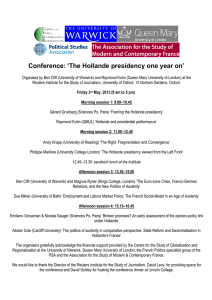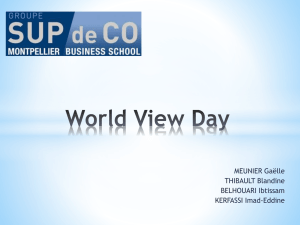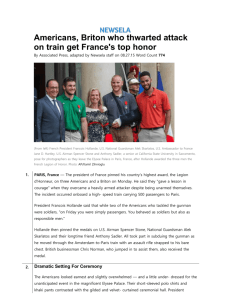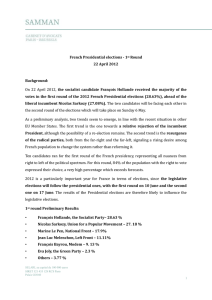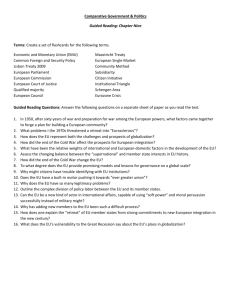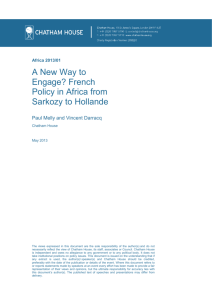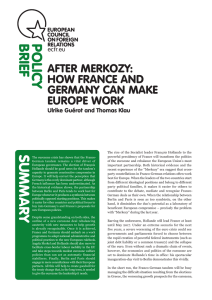Three French conundrums - European Council on Foreign Relations
advertisement
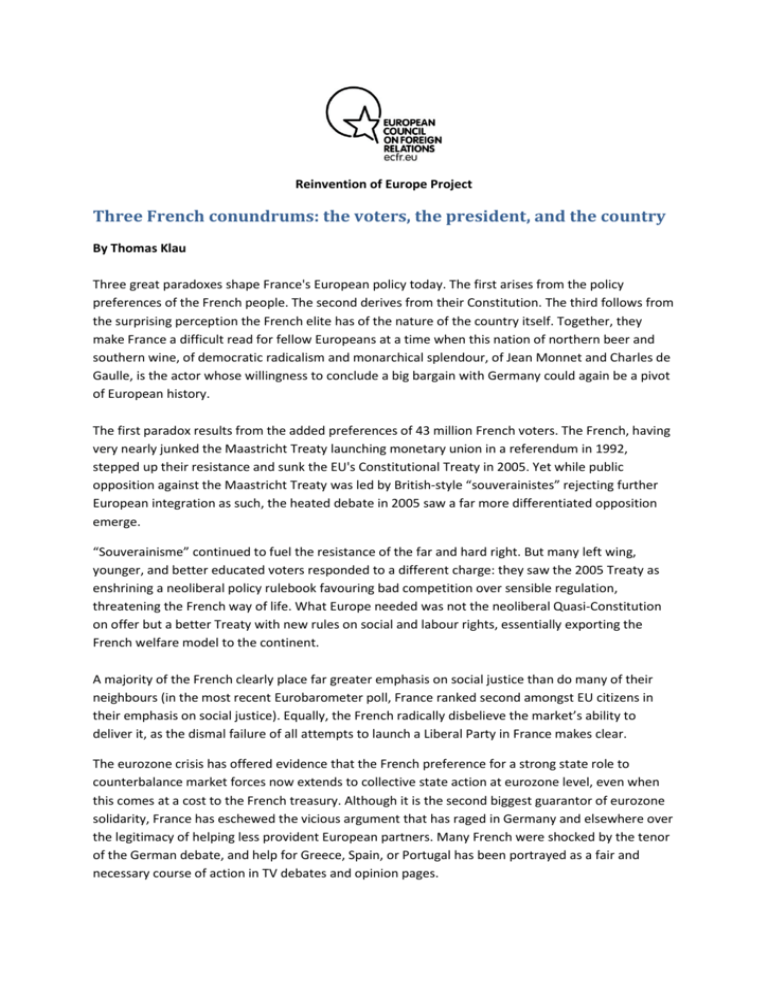
Reinvention of Europe Project Three French conundrums: the voters, the president, and the country By Thomas Klau Three great paradoxes shape France's European policy today. The first arises from the policy preferences of the French people. The second derives from their Constitution. The third follows from the surprising perception the French elite has of the nature of the country itself. Together, they make France a difficult read for fellow Europeans at a time when this nation of northern beer and southern wine, of democratic radicalism and monarchical splendour, of Jean Monnet and Charles de Gaulle, is the actor whose willingness to conclude a big bargain with Germany could again be a pivot of European history. The first paradox results from the added preferences of 43 million French voters. The French, having very nearly junked the Maastricht Treaty launching monetary union in a referendum in 1992, stepped up their resistance and sunk the EU's Constitutional Treaty in 2005. Yet while public opposition against the Maastricht Treaty was led by British-style “souverainistes” rejecting further European integration as such, the heated debate in 2005 saw a far more differentiated opposition emerge. “Souverainisme” continued to fuel the resistance of the far and hard right. But many left wing, younger, and better educated voters responded to a different charge: they saw the 2005 Treaty as enshrining a neoliberal policy rulebook favouring bad competition over sensible regulation, threatening the French way of life. What Europe needed was not the neoliberal Quasi-Constitution on offer but a better Treaty with new rules on social and labour rights, essentially exporting the French welfare model to the continent. A majority of the French clearly place far greater emphasis on social justice than do many of their neighbours (in the most recent Eurobarometer poll, France ranked second amongst EU citizens in their emphasis on social justice). Equally, the French radically disbelieve the market’s ability to deliver it, as the dismal failure of all attempts to launch a Liberal Party in France makes clear. The eurozone crisis has offered evidence that the French preference for a strong state role to counterbalance market forces now extends to collective state action at eurozone level, even when this comes at a cost to the French treasury. Although it is the second biggest guarantor of eurozone solidarity, France has eschewed the vicious argument that has raged in Germany and elsewhere over the legitimacy of helping less provident European partners. Many French were shocked by the tenor of the German debate, and help for Greece, Spain, or Portugal has been portrayed as a fair and necessary course of action in TV debates and opinion pages. Despite bringing down the Constitutional Treaty in 2005 (a major blow to integration dynamics within the EU), the French today accept the principle of intra-European financial “solidarity” far more easily than, for instance, their German neighbours. With 46 percent of French voters still having endorsed the Constitutional Treaty in 2005, further European integration could conceivably once again win French majority backing if it better reflected French preferences regarding the relationship between state and market (a broad consensus across much of the continent that the 2008 crisis had its roots in neoliberal deregulatory excess is likely to make it easier for future French treaty negotiators to win the political argument in Europe). A second great French paradox on Europe flows from the Constitution and more specifically from the written and unwritten powers wielded by the president. "This is a place where the raising of a presidential eyebrow has more significance than any ministerial speech”, a German ambassador in Paris told the author. To an extent that never fails to astound foreign observers, the French president can run most European and foreign policy essentially as he pleases. The one major constitutional exception, the cohabitation scenario whereby the president has to govern with a hostile political majority in the Assemblée Nationale and where the prime minister doubles as his chief political adversary, has become much less likely to occur since the cutting of the presidential term from seven to five years. “Please understand that I am much less powerful than you”, Germany’s chancellor Angela Merkel once told the former President Sarkozy, pointing to the numerous centres of executive, legislative, and judicial authority that constantly challenge and sometimes curtail her ability to act. Yet this astounding executive power, unique and even extreme by the yardstick of Western democracies, starts haemorrhaging away as soon as the French president calls a referendum on Europe - a move that François Hollande, the socialist leader elected in 2012, would be forced to undertake the moment he agrees to major European treaty reform. Many partners of France have failed to note that the times when a referendum on Europe was merely a political weapon of choice in the French presidential arsenal are gone – a major weakening of the presidential position. The change is relatively recent. In 2008, President Sarkozy just about managed to ram the Lisbon Treaty through parliament without a popular vote, having secured barely enough legitimacy to do so by announcing during his presidential campaign that he would eschew a referendum about a new EU treaty amounting to less than a European Constitution. President Sarkozy got away with it, but the ensuing protest was strong enough to redefine the unwritten boundaries of French presidential power. Aided by the general shift in Europe towards seeing a referendum as a more powerful source of legitimacy than parliamentary assent, a consensus has solidified in France whereby any major EU Treaty must be submitted to a popular vote. For a French president, losing a referendum on Europe would be a disaster precisely because the destruction of authority resulting from a defeat would be so very great (being solely in charge he would be seen as fully responsible). His influence over his political majority would be greatly reduced; if defeat would occur in his first mandate, his chances for re-election would be gravely compromised. His remarkably free hand over European issues enhances the French president’s power and prestige at home and abroad. Yet Europe now also generates his greatest vulnerability. ''We have spent our last cartridge on the Lisbon Treaty”, one of Hollande's advisers told the author. People, President, country: of these three major paradoxes the third is the most fundamental. It is a taboo topic for French policy makers and the hardest for foreigners to understand. On the face of it, hardly a country seems more cohesive than France; no other European democracy grants its state such imperial authority. While Madrid grapples with Catalonian separatism and London warily watches Scotland, no French border province shows signs of hankering for a future outside France. Yet many in the small elite running France don’t really trust it. This quasi-academic caste of men and women, their thinking shaped by rigorous training in the Grandes Écoles, has studied the slow genesis of France through military and matrimonial expansion, the preservation of the Republic through bloody submission of rebellious regions, and the homogenisation of the country though the suppression of regional languages. Many suspect that deep down France remains a fractious nation, and that a strong state anchored in Paris is needed to keep it “une et indivisible”, as the 1791 Constitution first proclaimed it to be. This astonishing national self-doubt shines through in the otherwise strange fact that France still has not ratified the Council of Europe’s Charter of Regional Languages, 20 years after its adoption. Where Germany, a far more recent creation with a history of devastating instability, has no existential fear of sharing sovereignty with Brussels, there is anxiety in the French elite that European federalism is an alien force powerful enough to fracture the French state and gravely destabilise the country’s cohesion. Understanding these three great paradoxes should be the first task for Europeans keen to engage the French on EU reform. The second lies in a realistic appraisal of France’s complex and fractured political landscape today. Again, three main facts stand out. First, the Europhobe National Front is now a well-entrenched force, its able leader Marine Le Pen appealing to many impoverished or disaffected citizens. The National Front may also benefit from the bitter infighting that has engulfed the mainstream conservative UMP Party following a recent leadership struggle. Second, the disarray of the mainstream right has exacerbated a political situation where François Hollande and his socialist-led coalition government face a far more insidious and potentially destabilising opposition from the far left of the political spectrum. Third, the refusal of a number of socialist MPs to vote for the Fiscal Compact in October 2012 despite significant government pressure shows the extent to which Europe is still a divisive topic for the Socialist Party, a problem burned into Hollande’s political consciousness since his party tore itself apart under his leadership during the referendum of 2005. Revealingly, ministers in Hollande’s government such as foreign minister Laurent Fabius or Europe minister Bernard Cazeneuve remain defined in the eyes of the public by the “No” vote they lobbied for in 2005. Since his election in spring 2012, President Hollande has charted a European policy course that closely reflects the parameters outlined above. Like all other French political actors, Hollande is convinced that no treaty reform could be agreed in Europe today that would survive a popular vote in France as long as the eurozone crisis continues and unemployment is on the rise. With defeat in a new referendum potentially disastrous for Europe and himself, the President for now has indefinitely postponed any EU reform capable of triggering IT. Instead, Hollande advocates a course of “integration solidaire”, arguing for a gradual process of deeper political, economic and social integration where new forms of supranational solidarity (such as eurobonds) are agreed first, with institutional change following. Details remain hazy, but it is clear that in terms of method, the gradualist “integration solidaire” clashes diametrically with the German consensus (precipitated by the constitutional Karlsruhe court) according to which major institutional reform must come first to create a sufficiently democratic framework for future new policy instruments. Hollande’s preference for an incremental approach to change has similarly informed his handling of the politically thorny issues of rewriting labour laws and the tax code to help French industrial competitiveness, and curtailing state spending to help lower the deficit. Such gradualism reduces the risk, ever present in France, of massive street protests triggering unrest within the presidential majority. But Hollande’s prudence so far has certainly come at the cost of clarity, raising concerns inside France and out that a timid do-nothing President would yield to anti-business sentiment and eschew real reform altogether. Fears of this have begun to recede, thanks to Hollande’s discarding of a hasty campaign promise by accepting the wisdom of shifting some non-wage labour costs onto VAT. Hollande will not want to apply the kind of reformist shock therapy to France that Germany undertook even before the eurozone crisis, and that is now being tested in a much harsher variant in Greece, Spain, and Portugal. The real test of Hollande’s willingness to reform will come only in 2013 on issues such as labour laws. For France and its president, the tension between the need for a better integrated Europe and the possible (or perhaps only perceived) threat to France’s cohesion remains the most difficult fundamental challenge to manage. Hollande has yet to reveal his own view of the continent’s possible future political shape: a reluctance for which he has been criticised. The president is known to be more open than most of his predecessors (including Nicolas Sarkozy) to the strengthening of Europe’s joint institutions. The question is how far he could and would choose to go. In a tantalising glimpse into his own thinking, during a TV debate in October 2011 Hollande said he could imagine a switch to majority voting in meetings of European heads of state and government, effectively discarding the national veto in the management of existing EU or eurozone policies. Hollande the candidate was not taken up on this radical proposal, and Hollande the president has not yet reiterated it. But his political biography speaks to the fact that Hollande, whose early thinking has been shaped by Jacques Delors and François Mitterrand and who names Helmut Kohl as a role model in the exercise of European power, will seek guidance from the European ideal of Jean Monnet rather than the vision of Charles de Gaulle. Thomas Klau December 2012 ECFR's National Paper series is edited by Nicholas Walton. This paper, like all ECFR publications, represents the views of its author, not the collective position of ECFR or its Council Members. To contact ECFR’s press office, please email press@ecfr.eu or call +44 (0) 20 7227 6880 or email staff directly using the formula firstname.lastname@ecfr.eu The European Council on Foreign Relations (ECFR) is the first pan-European think-tank. Launched in October 2007, its objective is to conduct research and promote informed debate across Europe on the development of coherent and effective European values based foreign policy. ECFR's London office: 35 Old Queen Street London, Greater London SW1H 9JA United Kingdom
